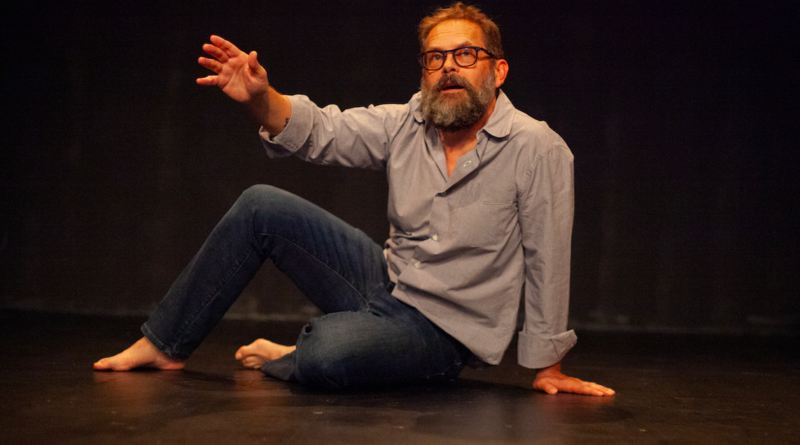INTERVIEW: Exploration of ‘Grief’ is at center of Colin Campbell’s solo show
Photo: Colin Campbell stars in Grief: A One Man ShitShow. Photo courtesy of Rebecca Asher / Provided by Everyman Agency with permission.
Colin Campbell crafted a new play called Grief: A One Man ShitShow after a family tragedy filled him with shock, anger and grief. A drunk driver killed both his teenage children, according to press notes, and one of his responses was writing Grief, which explores the many different realms of grieving that occur after a tragedy. Campbell had questions about family, about other people being unable to talk to him, about the effectiveness of grief groups and grief books. What he found during his exploration offered him a different perspective on the depths of familial loss and heartbreak.
Grief: A One Man ShitShow continues through April 16 at Theatre Row in Midtown Manhattan. Some of the observations in the solo show are also revealed in Campbell’s book, Finding the Words: Working Through Profound Loss With Hope and Purpose, which was released in March to coincide with this stage production.
Recently Hollywood Soapbox exchanged emails with Campbell about his journey thus far and what audiences can expect from the solo show, which originated in Los Angeles and is directed by Michael Schlitt. Questions and answers have been slightly edited for style.
First off, how are you doing?
Well, yesterday, March 29, was Ruby’s birthday, and today, March 30, is Hart’s birthday, so it’s hard. Those are tough days for me. But I am grateful to be able to be performing a show that honors them and their memory.
What does performing this show mean to you?
I wrote this play starting just a few weeks after the car crash that killed my two teenage children, Ruby and Hart. It was initially just this necessity to explore all the complicated and dark and overwhelming emotions that were rocking me. And I got to exorcise a lot of the rage in the form of dark humor. Performing it now feels like a way of honoring those early truths in grief, and I love the idea of normalizing grief and delivering a powerful counter to the prevalent notions of grieving as a quiet, sad, solitary activity. I love taking grief public as a way of helping others in grief not feel so isolated and unseen.
You say that the world has lost the ability to process intense grief. Could you explain further?
I think the way we process any emotion is to talk about it and share with our community. We invite people to our weddings and baby showers and graduations. So why don’t we share our grief as well? And yet, our culture seems to encourage grief and loss to take place behind closed doors. We are expected to grieve alone. And the prevalent notion is that we all grieve in our own mysterious way, therefore no one can really understand or share our pain. It leaves the griever feeling isolated and lost in unknown terrain. We have to figure it all out for ourselves. But because grief has become so private, it’s harder for us all to find the words that we need in order to process these immense emotions.
The press release for the show states that you’ve discovered people don’t know how to talk to you. How have you responded to that hesitation?
I discovered early on that I needed to talk with friends about both Ruby and Hart, and my own feelings of grief. But many friends were scared to talk because they worried they might say the wrong thing. So my wife and I developed what we called our “grief spiel.” We would pull people aside and tell them the ground rules — what we needed to talk about and what we didn’t want to talk about. It helped immensely. Our friends wanted to help us, so taking the time to tell them exactly what we needed was very useful. And our grief spiel changed as the weeks went by because our needs changed.
One might think such a piece can’t have humor, but it does. Why did you work in some humorous aspects?
Ruby and Hart loved to laugh and loved to make others laugh. All four of us appreciated a good joke. And inappropriate jokes were often the most beloved in our family. So my dark sense of humor honors Ruby and Hart. It also felt necessary to me. Being thrown into sudden, acute grief can feel so surreal and bizarre. Humor feels like the right response in certain moments. Also it’s a good way to exorcise some of the vast cosmic rage that comes with child loss.
Is hope an attainable goal?
I have found that the best way out of despair and hopelessness is to take action, to simply do something, anything, that keeps us engaged in life. And that action, in turn, will eventually draw you back into an emotional connection to life. In other words, act like it matters to you, and then it will eventually matter for real. I don’t believe a sense of meaning and purpose just spontaneously come to us; we have to go out and search for meaning and purpose. And that act of searching will bring us closer to hope.
By John Soltes / Publisher / John@HollywoodSoapbox.com
Grief: A One Man ShitShow continues through April 16 at Theatre Row in Midtown Manhattan. Click here for more information and tickets.

